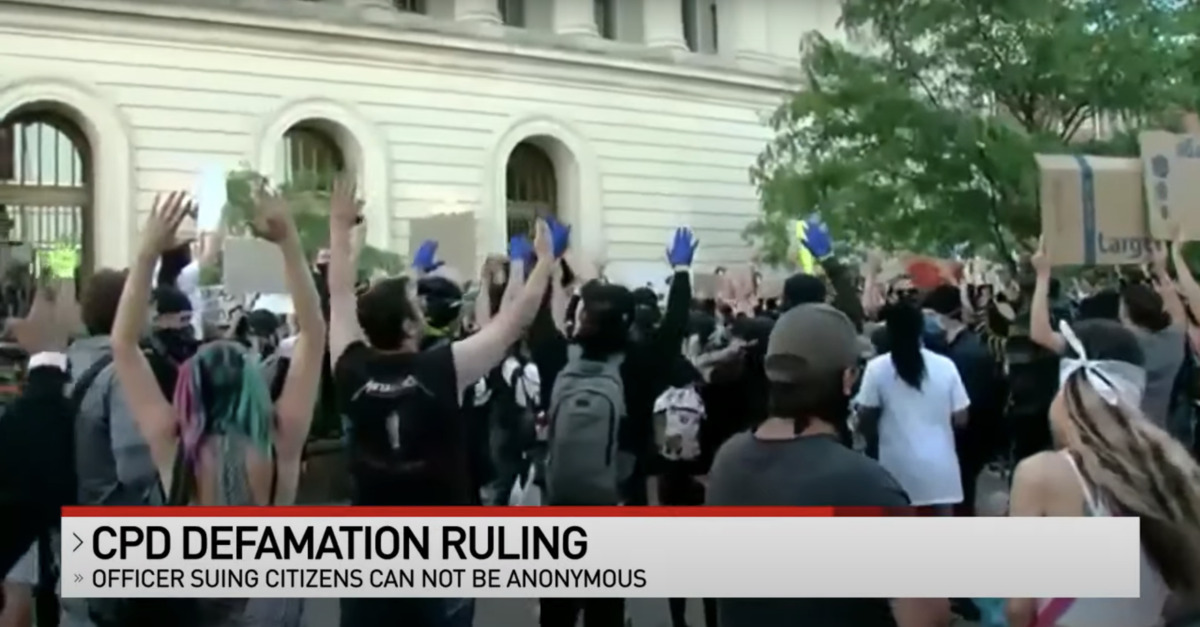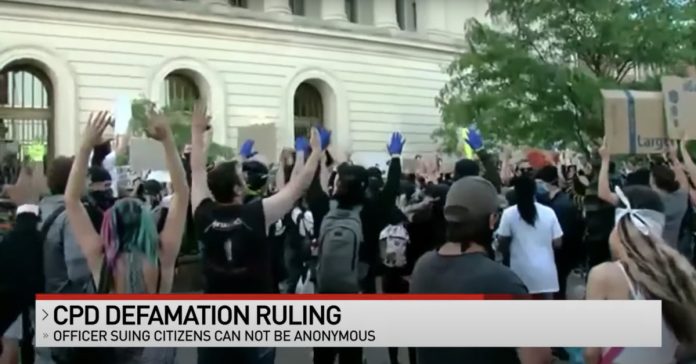
A screengrab from a local TV station showing Black Lives Matter demonstrators in Cincinnati in 2020; the chryron addresses an earlier development in the case. (Screengrab/WKRC)
An Ohio police officer has lost his defamation claims against several racial justice activists who accused him of being a racist and “white supremacist” during a dispute after a city council meeting in 2020.
A three-judge panel on Ohio’s First District Court of Appeals affirmed the dismissal of a defamation case brought by Cincinnati police officer Ryan Olthaus in a 16-page opinion released on Wednesday.
In July 2020, Olthaus, at first anonymously, filed a lawsuit complaining that Julie Niesen, Terhas White, Allisa Gilley, James Noe, and several other unnamed Does defamed him over his use of the “OK” hand gesture – where one’s thumb and forefinger connect in a circular shape while the three remaining fingers are extended.
A trial court initially allowed Olthaus to remain anonymous in court filings – though his identity was broadly known. The Ohio Supreme Court later made the officer’s name a matter of public record.
The underlying incident occurred during a demonstration that followed a special open forum held by the Cincinnati City Council in June 2020. There is no dispute that Olthaus made the hand gesture in question. The officer claims that gesture was meant to signify how a fellow officer was doing – in response to a question from White. The activists, however, took the symbol quite a bit differently.
“In various ways, they publicly criticized Officer Olthaus and his gesture, describing him, primarily in social media posts, as a ‘white supremacist’ and calling the gesture a ‘white power’ hand sign,” the appellate court explains.
Olthaus alleged some of the defendants spread false and defamatory statements about him in social media posts that referred to him as a “white supremacist kkkop” and “white supremacist piece of s–––,” among others. Additionally, Olthaus alleged two of the plaintiffs falsely filed complaints with a local oversight board that accused him of using a “white power” hand signal while on the job and for using “a white supremacy hand-signal towards citizens of color.”
In the summer of 2022, all of the defendants moved for dismissal. After various motions, Hamilton County Common Pleas Court Judge Megan Shanahan ruled in the activists’ favor, finding that all of their comments were either true or constitutionally protected under the First Amendment.
The officer subsequently appealed. But, the appeals court explains, he did not appeal on the actual merits of the case itself.
“Olthaus fails to directly address the trial court’s reasoning on appeal,” the opinion reads. “Instead, he emphasizes the notice-pleading standard and the harm that Defendants’ statements occasioned, responding to the trial court’s reasoning only to assert that ‘[i]n the political atmosphere that existed at the time of the incident, Appellees’ statements rose above mere opinion when they were designed to personally attack and cause harm.’ But this statement does not reflect the standard for recovery under Ohio defamation law.”
In a somewhat blistering opinion, the court goes on to point out the legal deficiencies in how Oltahus’s appeal was structured:
Tellingly, Officer Olthaus cites no case law to support this argument, does not suggest the trial court used the wrong legal standard in its decision, and does not assert that it misapplied any relevant case law. Rather, he broadly asserts that the trial court got it wrong and assures us that he could prove his point later in the litigation. Such an argument does not provide us with any basis for reversal. It is incumbent upon an appellant to explain to us, with citations to authority and the record, how the trial court erred.
The appeals court notes that the form of the appeal itself would have been enough to affirm the lower court’s dismissal. But, after all the dressing-down, the appeals court offers to address the “substance of the issues as we understand them.”
And, there, still, Olthaus falls short.
Calling the pejoratives used to describe the officer as racist “plainly subjective, value-based” and unverifiable, the court determined that there is no actual, commonly-understood meaning of the terms, but rather an emotional one that will be different based on the person reading them. And, the court found, the same was true for the hotly-disputed “OK” hand gesture.
“Officer Olthaus musters no argument for how someone would plausibly go about proving or disproving one’s white supremacist bona fides,” the opinion reads. “Similarly, Defendants’ assertions that Officer Olthaus flashed a ‘white power’ hand sign is not susceptible to reasoned methods of verification. It is undisputed that he made a particular hand gesture — what is disputed turns on the subjective meaning of the gesture, with both the officer and Defendants offering competing interpretations.”
In other words, the appeals court found that all of the accusations “represent opinions, rather than facts that can be tested to determine their veracity.” And, the court determined, “accusations of bigotry similar to those present here are not actionable in defamation.”
Notably, the appeals court found that the Ohio Constitution offers an even more ringing – and explicit – protection of opinion than the U.S. Constitution. The appeals court also went on to apply the First Amendment to the ancillary issue of whether or not some of the defendants acted with actual malice. That standard relies on a longstanding U.S. Supreme Court precedent that makes it nearly impossible for a public figure or official, like a police officer, to prove defamation.
“We recognize and appreciate Officer Olthaus’ point that the allegations of white supremacy were incredibly damaging to him, personally and professionally,” the opinion reads. “Social media has the capacity to ruin lives with the click of a button, but courts do not exist to referee debates on those platforms, nor could we do so consistent with the First Amendment and the Ohio Constitution.”
On March 2, when the trial court dismissed the officer’s lawsuit, Niesen posted on Twitter: “Today’s not a bad day for the First Amendment.”
On Dec. 27, when the appeals court affirmed the lower court’s ruling, she posted on X (formerly Twitter): “Today is *also* not a bad day for the First Amendment ”
Have a tip we should know? [email protected]

